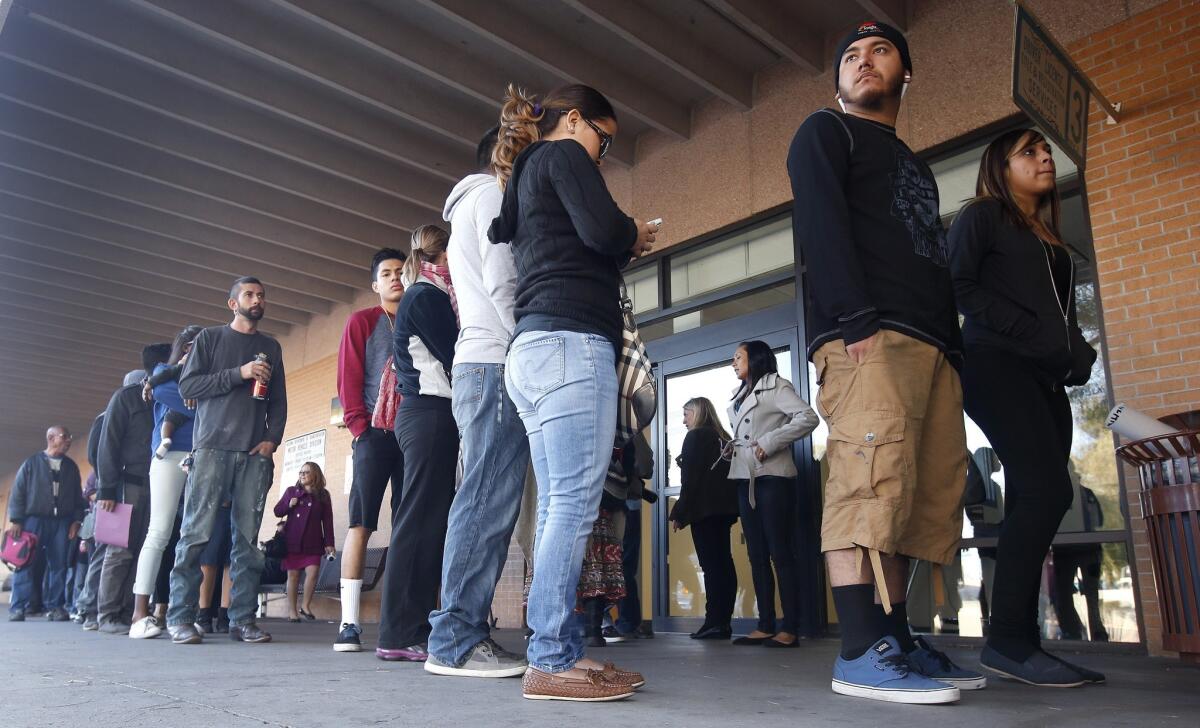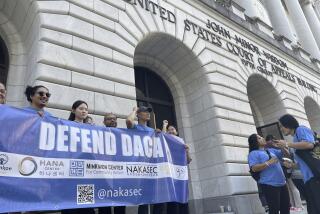Arizona defends denying driver’s licenses to ‘Dreamers,’ faces skeptical judge

Last December, lines stretched outside Arizona Department of Motor Vehicles offices, including this one in Phoenix. That was the first day immigrants protected from deportation under new Obama administration policies could pursue Arizona driver’s licenses.
Arizona’s legal team came to Pasadena on Thursday to defend the state’s refusal to issue driver’s licenses to so-called Dreamers, and found that one member of the U.S. 9th Circuit Court of Appeals was in no mood for legal maneuvering.
Under court order, Arizona began issuing licenses and ID cards in February for the estimated 22,000 immigrants covered by the federal Deferred Action for Childhood Arrivals, known as DACA. President Obama’s program gives Dreamers, the young immigrants who entered the U.S. illegally before their 16th birthday and who meet other requirements, a reprieve from deportation and the ability to receive work permits.
Arizona has incurred no ill effects because of the new, legal Dreamer drivers, said Judge Harry Pregerson.
“Nothing horrible has happened on the highways of Arizona,” said Pregerson, who was appointed to the 9th Circuit in 1979 by President Carter.
Pregerson asked why Arizona continued to try to deny benefits to Dreamers. “Does it come down to racism? Does it come down to discrimination against these people? What else does it come down to?” he asked.
“Judge, I wish you wouldn’t say things like that,” Arizona Assistant Atty. Gen. Dominic Draye replied.
Arizona contends that it has the right to decide who receives driver’s licenses, a right the U.S. government doesn’t contest.
But the state went further, saying in 2012 that it would not accept federal documents for Dreamers’ driver’s licenses and other benefits because the state believes the DACA program is unconstitutional.
A coalition of immigration advocates sued, and the state lost twice, first at the U.S. Supreme Court, then in a second challenge on different constitutional issues in February before U.S. District Judge David Campbell in Phoenix.
Arizona has historically provided driver’s licenses to residents in the country without authorization who were given administrative permission to stay, such as asylum-seekers. Denying those same benefits to DACA recipients amounted to discrimination, Campbell ruled.
Thousands of Dreamers received licenses after Campbell’s decision. The state appealed, and at Thursday’s hearing, Draye argued that Obama had no right to grant deferred status to immigrants.
“This was not promulgated under a formal rule-making, and it certainly isn’t legislation,” Draye said.
The Dreamer Coalition of Arizona argued the case on behalf of immigrants who were denied licenses under an executive order issued by former Gov. Jan Brewer just after DACA was announced.
That was in 2012. Since then, states have steadily dropped their objections to giving licenses to Dreamers. The penultimate holdout, Nebraska, ended its objections in May. Only Arizona continues to fight.
“The state wants to enjoy a prerogative it simply does not have,” Dreamer Coalition attorney Karen Tumlin told the three judges. “This case is about discrimination, pure and simple.”
The other two judges on the 9th Circuit panel, Marsha Berzon and Morgan Christen, primarily directed their questions toward Arizona’s analysis on the constitutionality of DACA.
Near the end of the hearing, Pregerson continued to push the attorneys toward discussing what Arizona’s decision would mean to thousands of people.
“They’re part of our culture, they’ve gone to our schools, they’ve made contributions,” Pregerson said. “The bottom line is, if there’s individual [scrutiny] of each eligible person who seeks the benefits of DACA, I guess that’s a terrible thing.”
Pregerson said in court that the three-judge panel would come to a decision “soon.”
Follow @NigelDuara for national news
More to Read
Sign up for Essential California
The most important California stories and recommendations in your inbox every morning.
You may occasionally receive promotional content from the Los Angeles Times.











